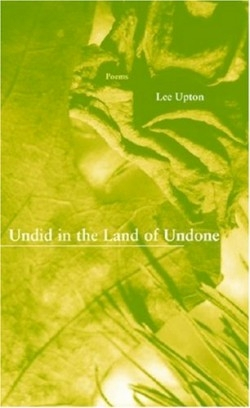Undid in the Land of Undone
- 2007 INDIES Winner
- Silver, Poetry (Adult Nonfiction)
In Upton’s fifth book of poetry, she returns to tableaus in history, both mythical and actual. She pictures Emily Dickinson with blossoms in her hands, Dido standing before the burning pyre at Carthage; even lines from Shakespeare become fodder for a rich imagining of scene. The poems move between ancient settings and modern metaphorical language, high seriousness and humor.
Upton is a much celebrated poet, winning a Georgia Contemporary Poetry Series Award and a National Poetry Series Award. In addition, she won two awards from the Poetry Society of America. Every moment has dozens of dangling threads which might be woven into a tale, and this curiosity extends to language as well as history. In her poem, “100 Ways to Say You’re Not Taking This As Well As We Hoped” she writes: “You, the one giving a testimonial to dread, / Hydraulic engineer of whimpers, / Last draft pick of the brain stem.”
The list of creative euphemisms continues with dizzying fecundity, each more biting than the last. In “Soitenly,” the poet begins “That I find Larry sexual is not something I would until now be likely to confess…” Unexpected references, such as he Three Stooges, add to the book’s light-hearted flavor.
In her central long poem, “Immortal Even More,” she investigates the story of Erysichthon and his daughter. From this myth, Upton plays with voices, as Louise Glück does in The Wild Iris, speaking as a god, a father, a narrator, and the changeling daughter. As with Glück, it is the authority of the voice, and its realizations, that drive the poem. Upton contends with many of the classical stories from Greek myth as well as the simplest of stories pitting man versus nature, but in each poem, she unearths the human in the animal and vice versa. The author writes to the unexpected.
Upton shatters the prescribed readings of ancient paintings and stories and rebuilds them, broadening their concerns to mirror contemporary living. It is with the title that she reconciles her funny poems with her more mythic, serious work. In the land of undone, the populous tries desperately to create, to do. As in life, the detritus of the undone surrounds them; the poems spring from the story untold. She embraces the paradox of creation stemming from the discarded. The poems ultimately result from that choice to create, and they reinvigorate both mythmaking and poetry.
Disclosure: This article is not an endorsement, but a review. The publisher of this book provided free copies of the book to have their book reviewed by a professional reviewer. No fee was paid by the publisher for this review. Foreword Reviews only recommends books that we love. Foreword Magazine, Inc. is disclosing this in accordance with the Federal Trade Commission’s 16 CFR, Part 255.

